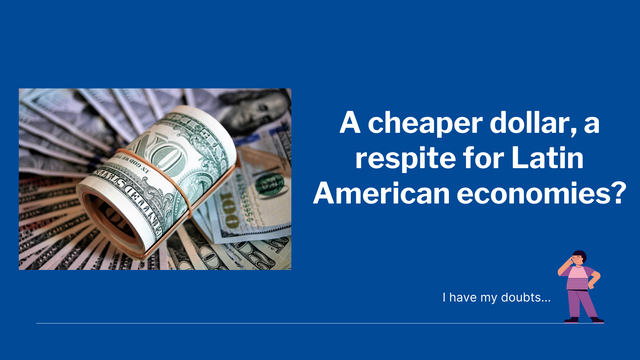Hello Project-Hope Community, I hope you are having a great weekend. Today I would like to share some thoughts regarding the world economy, very specifically regarding the fall in the price of the dollar and how this in theory should help Latin American countries, according to what I have been seeing, reading and hearing, however, in practice it is not real at all, at least not that I manage to perceive those benefits, rather, on the contrary.
According to what I have been able to investigate, when it happens as it has happened in the last few months, that the dollar reaches low prices in relation to the exchange rate of the official Fiat currency of a certain country, production is cheaper in addition to allowing greater competition in the international market for certain products, in view of the fact that producing them has been cheaper.

In addition to the above mentioned, there is an inverse relationship in the prices of raw materials and the dollar, if this low raw materials rise, and countries that export raw materials benefit much more, Well, I do not know how true that is.
Oil prices are quite high, for example, I currently live in Colombia, specifically in Bogota (capital city), This country is a major producer of oil, diesel, and other oils, it is also the second largest producer and exporter of coffee in the world, thermal pulses and coal, also has large gold mines, in short, I should assume that with all this, the country's income should increase considerably and be beneficial in the economy.

But the reality I sense is that the prices of all foods have gone up. Food is very expensive, and it looks like it will continue to rise. Dad, for example, until two years ago you could buy a sack for $12, now that same sack is worth up to $45, even though it is something that is harvested right here in the country. Not to mention pasta, which has gone up in recent months by at least 20%, the same with so many other things that are essential.
So this reality, contrasted with what economic theory says, I must say is not at all coherent. Maybe I am waiting for these "benefits " to arrive very fast, and I know that macroeconomics does not always move so fast, product of the same bureaucracy, or maybe it is the price speculation of intermediaries, something happens that I do not quite understand, and that is why I wonder if really A cheaper dollar, a breath of fresh air for Latin American economies?.


I authorize the use of this banner to everyone who wants to do it.
Twitter | Instagram | Discord | Youtube | Telegram: @josevas217
 |  |  |
|---|
Hello @josevas217, I can provide an example; 3 years ago with $10 I could buy enough food for 15 days, now with the same $10 I can barely buy food for 3 days, how can this be explained? If at least 3 years ago in Venezuela there was no open marketing of national and imported products and it was not easy to sustain the local economy with the course of 2 currencies (the Bolívar and the USD). I dare to conclude that in Latin America the common factor is speculation and, as you said, some bureaucracy.
Downvoting a post can decrease pending rewards and make it less visible. Common reasons:
Submit
Hi friend @josevas217, I think the effect of a cheaper dollar has a different impact depending on the context, on the one hand those who go on trips or buy raw materials abroad benefit from it, but in contrast, those who receive family remittances from abroad, or those who have labor contracts in dollars then perceive less pesos when making the change to the local currency.
Downvoting a post can decrease pending rewards and make it less visible. Common reasons:
Submit
Downvoting a post can decrease pending rewards and make it less visible. Common reasons:
Submit
Hi @josevas217 Very accurate your publication, I am in Venezuela that we come from years of hyperinflation, with a dollarized economy at least in practice, all products now do not increase in bolivars, increase in dollars, which makes you must generate the same way more dollars not bolivars, fluctuations in the price of the dollar in relation to the bolivar is another aspect that affects the domestic economy, the central bank sets a price and the stores another, always with the fear that it will skyrocket or devalue, successful.
Downvoting a post can decrease pending rewards and make it less visible. Common reasons:
Submit